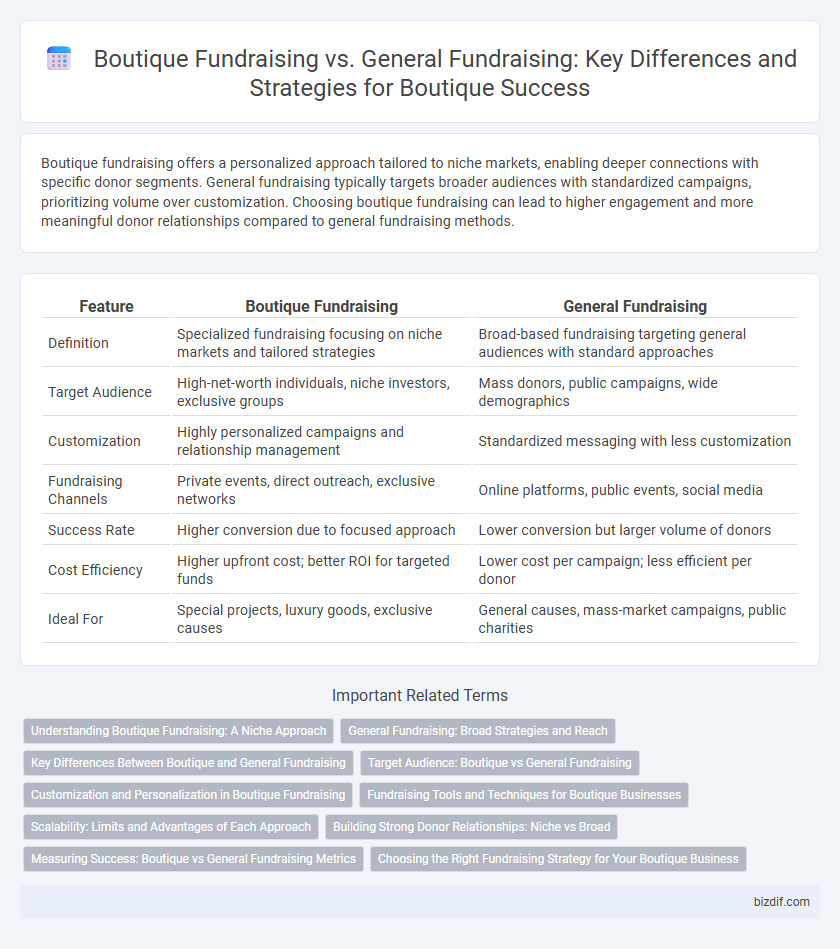Boutique fundraising offers a personalized approach tailored to niche markets, enabling deeper connections with specific donor segments. General fundraising typically targets broader audiences with standardized campaigns, prioritizing volume over customization. Choosing boutique fundraising can lead to higher engagement and more meaningful donor relationships compared to general fundraising methods.
Table of Comparison
| Feature | Boutique Fundraising | General Fundraising |
|---|---|---|
| Definition | Specialized fundraising focusing on niche markets and tailored strategies | Broad-based fundraising targeting general audiences with standard approaches |
| Target Audience | High-net-worth individuals, niche investors, exclusive groups | Mass donors, public campaigns, wide demographics |
| Customization | Highly personalized campaigns and relationship management | Standardized messaging with less customization |
| Fundraising Channels | Private events, direct outreach, exclusive networks | Online platforms, public events, social media |
| Success Rate | Higher conversion due to focused approach | Lower conversion but larger volume of donors |
| Cost Efficiency | Higher upfront cost; better ROI for targeted funds | Lower cost per campaign; less efficient per donor |
| Ideal For | Special projects, luxury goods, exclusive causes | General causes, mass-market campaigns, public charities |
Understanding Boutique Fundraising: A Niche Approach
Boutique fundraising specializes in tailored strategies that target a specific audience or niche market, leveraging deep industry expertise and personalized engagement to maximize donor commitment. Unlike general fundraising, which employs broad approaches to attract a wide range of donors, boutique fundraising prioritizes quality over quantity by cultivating close relationships and delivering unique value propositions. This focused method often results in higher retention rates and more substantial contributions within specialized sectors or causes.
General Fundraising: Broad Strategies and Reach
General fundraising employs broad strategies such as mass marketing campaigns, online crowdfunding, and community events to reach a wide audience and maximize donor participation. It leverages diverse channels including social media, email outreach, and traditional media to engage both small and large-scale donors across various demographics. This approach emphasizes scalability and diversity in funding sources compared to boutique fundraising's targeted, high-net-worth donor focus.
Key Differences Between Boutique and General Fundraising
Boutique fundraising emphasizes personalized investor relationships, catering to niche markets and specialized projects with tailored strategies, whereas general fundraising targets broader audiences with standardized approaches. Boutique funds often offer exclusive access and bespoke deal structures, contrasting with general fundraising's focus on scalability and widespread capital accumulation. This distinction results in boutique fundraising delivering higher engagement and customized solutions, while general fundraising prioritizes volume and efficiency.
Target Audience: Boutique vs General Fundraising
Boutique fundraising targets niche markets and high-net-worth individuals seeking personalized investment opportunities, offering tailored strategies and exclusive access to unique assets. General fundraising appeals to a broader audience, including retail investors and institutional participants, emphasizing scalability and mass-market appeal. Understanding these distinctions enables fund managers to align fundraising efforts with the specific preferences and expectations of their intended investor base.
Customization and Personalization in Boutique Fundraising
Boutique fundraising offers a tailored approach by customizing campaigns to align with each donor's unique interests and preferences, enhancing engagement and loyalty. This personalized strategy contrasts with general fundraising's broader tactics, which often lack the depth of individual donor connection. By focusing on personalized communications and bespoke donor experiences, boutique fundraising maximizes impact and donor retention.
Fundraising Tools and Techniques for Boutique Businesses
Boutique fundraising utilizes specialized tools and techniques tailored for small-scale, high-touch investor engagement, such as personalized pitch decks, niche CRM platforms, and exclusive networking events that foster deeper relationships. General fundraising often relies on broad-reaching digital platforms and mass communication strategies like crowdfunding sites and email campaigns designed for larger, diverse audiences. Boutique businesses benefit from customized approaches emphasizing quality over quantity, leveraging targeted outreach and bespoke presentations to secure funding more effectively.
Scalability: Limits and Advantages of Each Approach
Boutique fundraising offers personalized, highly targeted campaigns that build strong donor relationships but often struggle to scale beyond niche markets due to limited resources and reach. General fundraising benefits from broader appeal and larger audiences, enabling significant scalability but may sacrifice the intimacy and tailored strategies that drive deeper engagement. Understanding these trade-offs helps organizations choose an approach aligned with their growth objectives and fundraising capacity.
Building Strong Donor Relationships: Niche vs Broad
Boutique fundraising excels in building strong donor relationships by focusing on a niche audience with tailored engagement strategies, fostering deeper emotional connections and higher donor loyalty. In contrast, general fundraising targets a broad audience, often resulting in less personalized interactions that can weaken long-term commitment. By leveraging specialized communication and customized outreach, boutique fundraising enhances donor satisfaction and maximizes sustained contributions.
Measuring Success: Boutique vs General Fundraising Metrics
Boutique fundraising prioritizes personalized donor engagement and measures success through donor retention rates, average gift size, and long-term relationship value, whereas general fundraising emphasizes broader metrics such as total funds raised, campaign reach, and event attendance. Boutique campaigns often track qualitative data like donor satisfaction and bespoke impact reports to gauge effectiveness. In contrast, general fundraising relies heavily on quantitative metrics, making boutique fundraising ideal for organizations aiming for deep, sustained donor connections over large-scale appeals.
Choosing the Right Fundraising Strategy for Your Boutique Business
Boutique fundraising offers tailored investment opportunities specifically designed for niche businesses, providing personalized support and higher engagement compared to general fundraising methods. General fundraising involves broader approaches that target a wide audience but may result in less customized strategies and diluted investor interest. Selecting the right fundraising strategy for your boutique business depends on aligning investor profiles with unique business goals and leveraging specialized networks to maximize capital and strategic growth.
Boutique Fundraising vs General Fundraising Infographic

 bizdif.com
bizdif.com